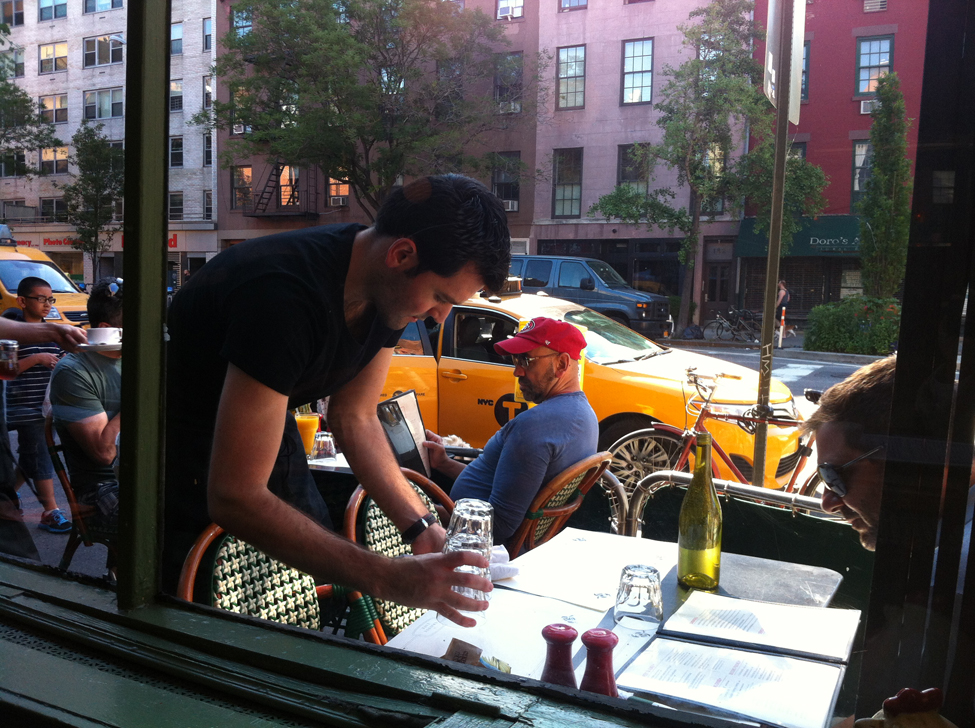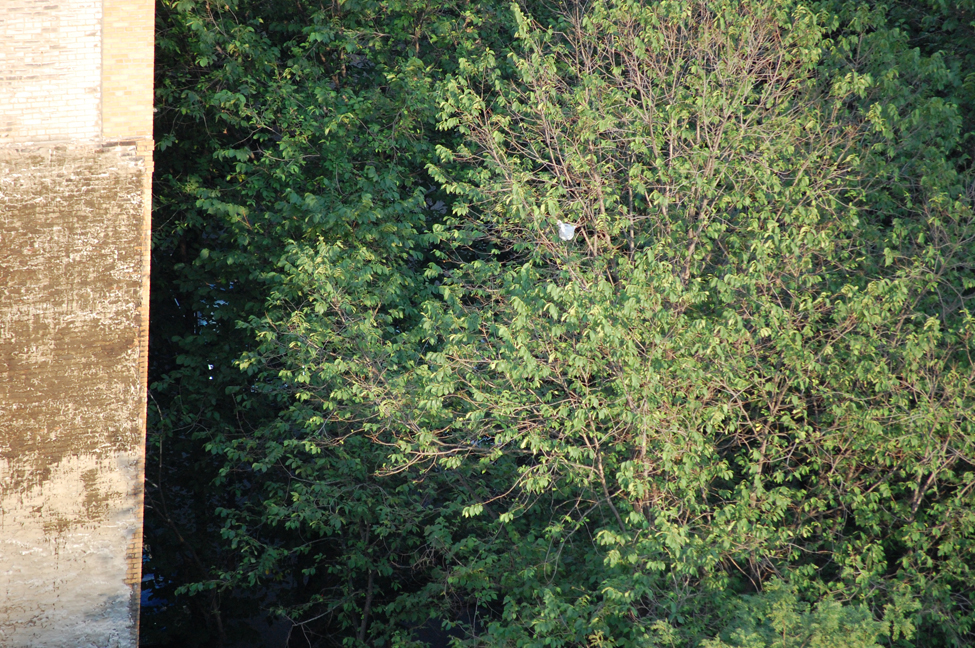XLVI
To alms, to alms – the tourists are coming!
So much depends on how one weight one’s metaphors.
Language being a double trap: on the one hand, the illusion of pure description, on the other the distortions immanent, and actualized, in figures of speech.
Manichean pedicure.
Manipedicab?
Is that which is morbid a bid for more?
In this breast of all possible worlds.
Art no-vue
As the mullion said to the glazier: I feel your pane.
Given the similarity of certain words to others, when we hear a phrase spoken in an accent, we can be unsure as to what is meant. In some cases this works to open up a previously unseen nuance. E.g.: When I was young, I tasted the limits of my body every day…
Of pedagogy
A focus on training makes sense if you have some idea what you are training for. Hence the emphasis on sports, particularly team sports, in this country. We are training military-corporate personnel. The fact that we do not openly say this, or necessarily think it, does not mean that we don’t know it.
When one looks at outcomes one can often backform as sense of intentionality. Even in the progressive school I went to there was a focus on particular subjects with very little sense of the relational. Though no pavlovian bell rang to change periods, we simply shifted from subject to subject, as though we were butchering a cow. Of course, the cow was a sectioned-out body of knowledge and skills, but it was also ourselves. We were learning to destructurate our naturally integrated selves by parsing experience.
Never was it suggested, much less spoken outright, that we might seek to find, or recognize within ourselves and the world around us, a relational structure, a harmony, a balance. Quite the opposite. Partiality was the underlying rule, the a priori. We were praised for things we were good at and reprimanded for not being more skilled at other things. We were encouraged to internalize an external disciplinary structure rather than feel our way toward a simultaneously internal and externally dynamic form of being in the world. The idea of a balanced, integrated body of knowledge, or, more importantly, of body as a whole, seems to have been entirely absent from the pedagogy. And this in one of the most “enlightened” schools on the planet.
It took me many years to figure out that if the predicate, the a priori of a system is not correctly founded, the articulation of that system will tend toward instability and malfunction. It will also have a very compromised capacity to self-perceive and self-correct. It took many years, too, for it to really percolate down into my deeper awareness that social systems are built-out forms of collectively held intentionalities and that our skill in mechanical engineering and abstract thought had advanced way in front of our emotional and psychological maturity. We progressively knew less and less about how to live, much less how to live with what we made.
What this implies is that until we begin to be aware of this disjunction, and look to the nature of our predicates, we will continue wondering how it is that the wheels we shape with such sincerity, and which looked fine in blueprint, so often come out square. We will continue to produce children whose internal landscape is marked by a fundamental rupture in the fabric of reality, one which forces them to chose, or alternate between, obsessive focalization and a scattering of their energies.
You see, I think we have to get rid of people being proud of their ancestors, because after all they didn’t do a thing about it. What right have I to be proud of my grandfather? I can be proud of my child if I didn’t ruin her, but nobody has any right to be proud of his ancestors.
Said Margaret M. in R on R.
Once when I was arrested, the judge released me on my own recognizance. It was a formulation I realized was remarkable at the time, but it took many years to make its way into my heart and belly.
You can help end Elephant Albinism right now.
Or just turn the page.
Plurality distills to the singular. Singularity disperses to the plural.
Mystery is the only way I can define it. It is not mystical, but it seems to me that your ancestors give you, if you trust them, something to get through the world.
Baldwin in R on R.
The dreams you don’t own end up owning you.
Contention, apprehension, reprehension: don’t you ever get tired?
The West aka The Disorient.
The U.S. isn’t and has never been a melting pot. It went straight from slaughterhouse to chop shop. Grand Theft somethingorother.
Digital: the fantastic ramification of presence and absence.
Sing. Gap. Pore.
What happens when a cycle refuses to close?
There are two (often reciprocal) forms of madness: Disorientation and Fixation.
Layers and layers: The Great Game, the Caliphate. And before that, Gilgamesh. And the Tigris flows on, through Diyarbakur, Mosul (Nineveh) and Baghdad (Abode of Peace, Mother of the World, Gift of the Gods, Abode of Beauty, Round City, Umm Al-Basatin: Mother of Orchards).
Everyone can’t be alive all the time.
Inevitably we teach by example. Whether we want to or not.
David Leeming’s well-tempered biography of the painter Beauford Delaney, James Baldwin’s friend and mentor, contains some remarkable passages, drawn from Delaney’s notes and journal entries.
Delaney’s arrival in New York City in 1929 – he was born in Knoxville and had lived in Boston and studied art there for several years prior – was attended by an immediate and traumatic loss of all his possessions. Having wandered into a Union Square, filled with vagrants, he “lit a cigarette and somewhat collected myself. This was the…depression and I soon discovered that most of these people were out of work and just doing what I was – sitting and figuring out what to do [for] food and a place to sleep.”
Delaney was befriended by a man who told him that the police allowed people to sleep in the park and together they went to a café that allowed customers to stay as long as they liked as long as they ordered something to eat or drink. There, “being tired and a stranger suddenly with nothing but a few dollars in my pocket and knowing not a soul, I embraced in my mind the idea of the enormous difference among the great masses of people with nothing – tha camaraderie and immediate understanding which can sometimes happen by chance.”
He found himself among “a multitude of people of all races – spending every night of their lives in parks and cafes and seeming very much in a good mood.
[I] felt a new kind of stimulation growing and sending out curious fancies…somehow someway there was something I could manage if only with some stronger force of will I could find the courage to surmount the terror and fear of this immense city and accept everything insofar as possible with some calm and determination – the determination among the young [in the park and cafe] was contagious and quickening to my state of shock and after two cups of coffee and rolls I began to find things to talk about other than myself.”
Writes Leeming: These people and their outdoor life would become the subject of some of Delaney’s greatest New York period paintings. He listened carefully to his new friends and through them learned something of the bohemian life. He realized that if they could survive he could – if only he could learn from them: “These were natives of N.Y.C. and among millions to whom every day was a challenge of how to exist through it.”
Delaney remained in New York for twenty-three years.
Between 2000 and 2012, the population of Brooklyn went from 41 to 50 per cent “white.” The average rent increased 77 percent.
One result is that, according to a Post article, “Brooklyn’s courthouses are being rocked by the ‘Williamsburg Effect.’”
“The influx of well-off and educated white people to trendy neighborhoods such as Williamsburg is rapidly ‘gentrifying’ the borough’s jury pool and transforming verdicts…”
“’The jurors are becoming more like Manhattan – which is not good for defendants’ noted veteran defense lawyer Julie Clark.
“They are much more trusting of police, Clark said of the jurors. ‘I’m not sure people from the University of Vermont would believe that a police officer would plant a gun.’
“Former Brooklyn prosecutor and defense Lawyer John Paul De Verna said ‘The Williamsburg Effect affects every case that goes to trial.’
“’A contrarian-minded person – and Billyburg has them in spades – can cause discord in the jury room. And if the hipster gets along with everyone, that can be more dangerous because they are confident and educated, which means they have the potential to hijack the jury.’
“’The grand jury used to have an anti-police sentiment. When I was a prosecutor 22 years ago, a jury would be 80 percent people of color,’ said high-profile lawyer Arthur Aidala. ‘Now grand juries have more law-and-order types in there.’
“’People who can afford to live in Brooklyn now don’t have the experience of police officers throwing them against cars and searching them. A person who just moves here from Wisconsin or Wyoming, they can’t relate to that. It doesn’t sound credible to them.’
“Meanwhile, civil juries have become more pro-defendant.
“’There’s an influx of money, and when everything gets gentrified, these jurors aren’t pro-plaintiff any more,’ said plaintiff lawyer Charen Kim…
“Plaintiff lawyer Edmond Chakmakian said he was so sure that the civil jury weighing his client’s case would be tainted by the ‘Williamsburg Effect’’ that he settled just before a verdict for damages was announced.
“His client, Brian Petrides, had sued the city after he fell from scaffolding while working at a Brooklyn school and suffered debilitating injuries.
“Chakmakian settled for $6 million – and later found out that the conservative jury would only have awarded his client $2 million.
“”I absolutely felt like I had a much different jury on my hands than I would have had five years ago – they were MBAs and attorneys, everyone had an advanced degree,’ Chakmakian said.
“’There were very few minorities on the jury. It was a real white-bread jury. It’s a whole different ballgame.’”
The above from Joshua Saul, “Hipping the Scales of Justice,” New York Post, June 16, 2014, p. 4.
But then, the legal system in Billyburg, as everywhere is, at least in part, a mechanism for removing sovereignty from the people. With every law that passes onto the books, and every sheep-like following of those precepts, the people, become a little more powerless. Their, our, essential moral groundedness is drawn out into a series of decisions no less arbitrary and capricious for their technical legality.
There is a simple physics to this that applies to more than law: social life invariably suffers when we allow abstract systems of thought to control material circumstances. The abstract system grows to function less as a mediation of social life, and more as a kind of supra-human substitute for it. It’s a bit like permitting the “cloud” to take charge of your data. It exists somewhere out there, until it doesn’t.
Oh, meta, now we’re infra it.
Sometimes it’s hard to get an edge in wordwise.
Writing about New York is like doing graffiti on a whale. It’s an impossible canvass.
Writing in New York is like being digested like a python.
What kind of man would steal another man’s shoes?
Make your sandwiches scream with flavor, enthuses the young woman’s voice in a radio ad for cold cuts.
Hey, boyz, you’ve got female.
If at first global civilization doesn’t succeed, tribe, tribe again.
Scotoma, mon amour.
Media as institutional blind spot: the scrotomat.
“I never drew a decent thing until I felt the rhythm of New York,” said Beauford Delaney to the New York Telegraph in 1930. [David Leeming, Amazing Grace: A Life of Beauford Delaney. New York: Oxford University Press, 1998. p. 36.]
To be or not to be. That is the supremely Western question.
As the weather warms, a thousand bamboozle shoots spring out of the earth, nourished by the spring rains.
I can bamboozle the tough into acting tame,
Bamboozle the gent into dumping the dame,
Bamboozle the innocent into taking the blame
Bamboozle the winner into conceding the game.
I’m selling crutches today, so this is the aim:
I’ll bamboozle a man into thinking he’s lame.
Says Zhao Benshan, “Selling Crutches.” [Quoted by Hu Yua, trans. Allan H. Barr. China in Ten Words. New York: Anchor Books, 2011]
In China, the term bamboozle has become very popular of late, particularly in the Northeast from where Zhao hails. There, it derives from two sources, one of which is to sway unsteadily, like fishing boats bobbing on the waves, or leaves shaking in the wind. The other is from a similar sounding phrase which means to mislead.
All activity in the kindergarten must be quiet, unexciting. All of it was designed to prepare children for the long years of discipline ahead. Kindergarten got them ready to be bamboozled by the 1st Grade. Wrote Caroline Pratt, founder, in 1914, of the City and Country School, of her experience with conventional early childhood pedagogy.
I think it is very bad only to respond to violence and not respond long before there is violence. Said Margaret Meade in R on R.


